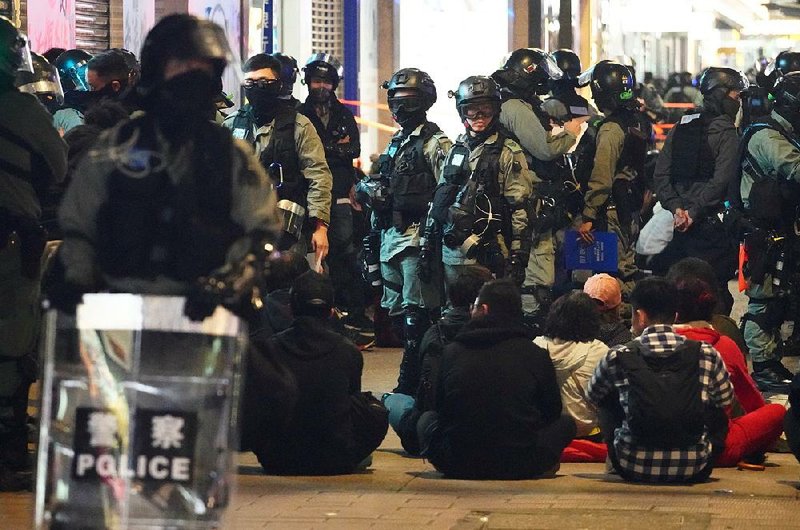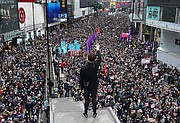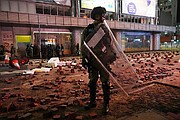HONG KONG -- Hundreds of thousands of people packed Hong Kong streets for a New Year's Day protest march as the monthslong pro-democracy movement extended into 2020 with further violence between police and demonstrators.
Nearly a month of relative quiet abruptly ended Wednesday with the sounds of protesters' chants and police officers' tear-gas rifles.
A peaceful New Year's Day march descended within a few hours into violent clashes. Riot officers deployed water cannons and pepper spray. Protesters built barricades out of umbrellas and paving stones and vandalized at least two branches of a leading bank in the city, HSBC.
The trappings of the previous six months were there -- the all-black dress code, the face masks and the odd Molotov cocktail. But the context of Wednesday's march was decidedly different. When the protests began in June, the tone was one of righteous anger. Now, it's more like doubt.
[Video not showing up above? Click here to watch » https://www.youtube.com/watch?v=QkCrato82gE]
"The government is not willing to back down at this moment," said Grace Ng, 30, a public relations professional who has attended half a dozen marches since the protests began. "I want the government to compromise, but I think there isn't enough international attention at the moment to make them bow down to the people."
As the movement enters the new year, its momentum is in question. It remains to be seen whether protesters have the stamina, public support or inclination to continue to battle the government, which has repeatedly said it will not concede to their demands for greater democracy.
It is also unclear how long the city itself can endure a movement that has already resulted in 6,000 arrests and an economic recession.
"I believe a lot of us have no idea what to do next," said Jessica Man, 19, a university student. "I don't know what we could do to keep ourselves going."
At the heart of the protests is concern about the erosion of civil liberties in Hong Kong, a former colony that was promised a unique set of freedoms when Britain handed it back to China in 1997. Those fears have been compounded by economic issues, including soaring housing prices, income inequality and a dearth of high-paying jobs.
In November, Hong Kong expressed its support for the protests at the polls, overwhelmingly electing pro-democracy politicians to neighborhood offices. It was a stinging rebuke to Communist Party officials in China, and it ushered in the longest period of relative calm since the protests began.
Wednesday's march was the second large-scale demonstration that police had authorized since the election, and tens of thousands of people took to the streets, if not more. But Senior Superintendent Ng Lok-chun told reporters that "rioters" hijacked the protest march and at one point endangered police officers by surrounding and throwing objects at them, which led to police ordering the rally to be called off at 6:15 p.m. Thousands, however, remained in the area, and many had yet to set off from the starting point at Victoria Park.
Ng said about 400 people were arrested.
The Civil Human Rights Front, which organized the march, called the police's decision "absurd" and accused them of escalating tensions by firing tear gas at a crowd. It said in a statement that unless protesters' demands were met, "Hong Kongers shall not back down, and peace shall not resume with ongoing police brutality."
By nightfall, familiar scenes were playing out on the streets, as protesters built barricades, lit fires and squared off against the riot police. Several dozen people were rounded up by the police in the Causeway Bay area. Witnesses said some of them had been bystanders. A pro-democracy lawmaker, Ted Hui, was pepper-sprayed directly in the face by a police officer, after the officer tore off Hui's protective goggles.
Wednesday's protest came after overnight clashes between police and protesters on New Year's Eve in a densely populated shopping district. Police then also used tear gas, pepper spray and water cannons to break up groups of demonstrators who blocked traffic and lit fires in the street in the working class district of Mong Kok.
The protests began in June over legislation, long since scrapped, that would have allowed extraditions to mainland China, where the courts are opaque and subordinate to the Communist Party. The protesters have since expanded their demands to include a broad range of grievances, including greater democracy and an investigation of alleged police brutality.
The march Wednesday stretched the movement's scope further, calling on people to join labor unions with an eye toward future strikes and to resist a feared crackdown on Hong Kong educators who have links to the movement.
Hong Kong's chief executive, Carrie Lam, has struggled to deal with the unrest while also satisfying her superiors in Beijing.
On New Year's Eve, Lam addressed the territory and called for calm ahead of the protest. "Let's start 2020 with a new resolution, to restore order and harmony in society. So we can begin again, together," she said in a video message.
"We must handle the problems at hand and acknowledge the shortcomings in our systems as well as the deep-rooted problems and conflicts that have been accumulating for many years in our society," she said.
Lam, who introduced and eventually withdrew the extradition bill that set off the protests, has promised to address social and economic issues that she says underlie the unrest. But the government said in a statement Wednesday that "the top priority now is to stop violence and restore social order as soon as possible so that the daily lives of people and various business activities can return to the normal track."
Lam on Tuesday also reinforced the importance of the "one country, two systems" framework under which China rules Hong Kong and which brooks no challenge to the ruling Communist Party's ultimate authority.
It is a message that has been echoed in Beijing. China's top leader, Xi Jinping, who has permitted a degree of public protest in Hong Kong that is unheard of on the mainland, mentioned the protests in his New Year's Day address, saying that "Hong Kong's prosperity and stability is the wish of Hong Kong compatriots and the expectation for the people of the motherland."
Information for this article was contributed by Russell Goldman and Elaine Yu of The New York Times and by staff members of The Associated Press.
A Section on 01/02/2020


